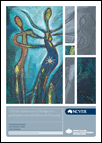Description
This study provides an important innovation to the existing literature by explicitly attempting to measure 'cultural attachment' and its relationship with post-compulsory education and training.
Summary
About the research
It has been well documented that Indigenous Australians experience marked disadvantages across all dimensions of socio-economic wellbeing when compared with the life circumstances enjoyed by non-Indigenous Australians. This includes poorer educational outcomes, employment and economic status.
Central to this is the tension between the objectives of strengthening Indigenous cultural attachment and maintenance of elements of traditional lifestyles on the one hand and the objectives of achieving equity in mainstream social and economic indicators on the other.
This study examines the role of traditional Indigenous culture in shaping Indigenous Australians’ engagement with education and training. It provides an important innovation to the existing literature by explicitly attempting to measure ‘cultural attachment’ and to model its relationships with socio-economic outcomes.
Key messages
- In non-remote areas, cultural attachment is complementary with both educational attainment and participation in vocational education and training.
- Whether individuals are living in remote or non-remote Australia, we can reject the view that there is a trade-off between maintenance of Indigenous culture and achievement in education and training.
- There is evidence both of education and training being pursued to enhance objectives relating to cultural maintenance, and of cultural attachment itself having an enabling effect on Indigenous people.
- However, those living in remote and very remote Australia are clearly disadvantaged in terms of their access to education and training, and this disproportionately affects Indigenous Australians with stronger attachment to their traditional culture.
Tom Karmel
Managing Director, NCVER
Related items
In this interview, Steve Davis talks with researcher Michael Dockery about his report, 'Cultural dim… Show more
This overview looks at the key findings of Mike Dockery's report 'Cultural dimensions of Indigenous… Show more
This study provides new evidence on the inter-relationships between Indigenous Australians' associat… Show more
